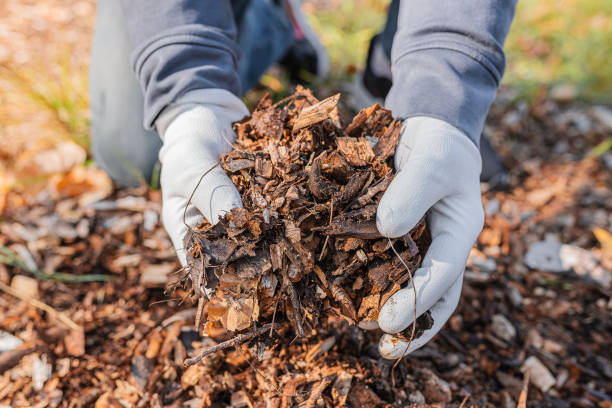
Every gardener knows the transformative power of mulch. That beautiful layer of wood chips, shredded bark, or straw keeps your plants happy and healthy by retaining moisture, suppressing weeds, and regulating soil temperature. But like all things, mulch eventually ages. So, what do you do with that old mulch? Throwing it away is the least sustainable option!
The West Texas sun can be harsh on Lubbock’s landscapes. Mulch becomes a vital tool for retaining moisture, suppressing weeds, and regulating soil temperature for your plants. But like all things, mulch ages. Understanding how mulch decomposes and what to do with it at each stage will help you maximize its benefits and minimize waste in your Lubbock yard.
Whether you’re a seasoned gardener or a newbie just starting out, you’ll find valuable tips and tricks to ensure your old mulch benefits your garden and minimizes waste. Let’s get started and discover the many possibilities for your used mulch!
How Mulch Gets Older
Mulch, typically made from organic materials like wood chips, bark, shredded leaves, or straw, undergoes a natural process called decomposition. This breakdown is caused by microorganisms like fungi and bacteria, who feast on the mulch, breaking it down into simpler components.
Here’s a breakdown of the stages of mulch decomposition:
Fresh Mulch: This is the initial stage where the mulch is chunky and retains its original color and texture.
Partially Decomposed Mulch: Over time, the mulch begins to break down, becoming smaller and darker in color.
Highly Decomposed Mulch: At this stage, the mulch is significantly reduced in size and has a crumbly texture. It may resemble dark, rich soil.
What Happens If We Keep Old Mulch?
There are both benefits and drawbacks to keeping old mulch:
Benefits of keeping old much:
Retains Moisture: Partially decomposed mulch still helps retain moisture in the soil, benefiting your plants.
Weed Suppression: Even broken-down mulch can provide some weed suppression, though less effectively than fresh mulch.
Soil Amendment: Highly decomposed mulch becomes a valuable soil amendment, adding organic matter and improving soil fertility.
Drawbacks of keeping old much:
Reduced Effectiveness: Decomposing mulch loses its bulk, becoming less effective at weed suppression and moisture retention.
Aesthetically Unpleasing: Faded and broken-down mulch can look unattractive in your landscaping.
Mat Formation: Very decomposed mulch can form a mat on the soil surface, hindering water penetration.
How to Reuse Old Mulch:
Top-up Strategy: For partially decomposed mulch that’s still in good shape, simply add a fresh layer on top. This refreshes the appearance and extends the effectiveness of the mulch.
Composting Champion: Undyed and untreated organic mulch like wood chips or shredded bark is a fantastic addition to your compost pile. Break up large pieces for better aeration and add them as brown material.
Soil Enrichment: Highly decomposed mulch can be tilled or dug directly into your garden beds, enriching the soil with organic matter and improving drainage.
When Not to Reuse Mulch:
Avoid reusing mulch that shows signs of:
Disease: Diseased mulch can spread pathogens to your healthy plants.
Chemical Treatment: Mulch treated with chemicals or dyes can harm your plants and shouldn’t be composted.
Advanced Mulch Management for Lubbock Gardeners:
What to Do With Old Mulch That’s Faded:
Faded mulch doesn’t necessarily mean it’s unusable. If it’s still partially decomposed, you can:
Rotate it: Move the faded mulch to the back of your beds and use the fresher-looking mulch towards the front.
Dye it (with caution): There are special non-toxic dyes available for mulch. However, this is an additional step and may not be the most eco-friendly option.
What To Do With Old Mulch That Is Decomposed:
Highly decomposed mulch is like black gold for your garden. Here are your options:
Soil Amendment: As mentioned before, till it directly into your beds for a fertility boost.
Seed Starting: Use it as a component in seed-starting mixes, providing aeration and moisture retention.
Potting Mix Ingredient: Add a small amount of decomposed mulch to potting mixes for improved drainage and structure.
What Do You Do With Old Mulch When Composting Isn’t An Option?
Lubbock may have some unique options for mulch disposal besides composting:
City of Lubbock Citizen Convenience Stations: The City of Lubbock offers drop-off points for residents to dispose of yard waste, including mulch, free of charge as long as the volume is equivalent to a pickup truck bed and covered to prevent spillage. https://ci.lubbock.tx.us/departments/solid-waste-management/proper-waste-disposal/commercial-landscape-waste
Sharing is Caring: Offer leftover mulch to friends, neighbors, or community gardening projects in Lubbock. Lubbock Master Gardeners Association maintains a community garden and may be happy to accept your usable mulch.
Consider Burning (with Extreme Caution): This option is a last resort and requires extreme caution due to Lubbock’s dry climate and high fire risk. Burning should only be done in a designated burn pit and never in open air. Always check local regulations regarding open burning before considering this method.
Important Note: Never burn dyed, painted, or chemically treated mulch. Burning these materials releases harmful toxins into the air.
The Takeaway: While disposal might be unavoidable in some cases, prioritizing reuse and repurposing should always be the goal. Remember, a little planning goes a long way in creating a sustainable and beautiful Lubbock landscape that thrives in the unique West Texas climate.
What Do You Do with Old Mulch That Isn’t Reusable?
While most old mulch can be repurposed in some way, there are situations where disposal might be necessary. Here’s what to do with mulch that’s truly unusable:
Landfill Last Resort: Landfills should always be the final option. Before resorting to this, check if your local landfill even accepts yard waste, as some have restrictions.
Explore Alternative Disposal Options: Some communities offer special mulch or yard waste disposal days where they collect and process unusable organic materials. Look into such programs in your area.
Consider Burning (with Caution): This option requires extreme caution and may not be permitted in all areas. Burning should only be done in a designated burn pit and never in open air. Always check local regulations regarding open burning before considering this method.
Important Note: Never burn dyed, painted, or chemically treated mulch. Burning these materials releases harmful toxins into the air.
The Final Touches: Keeping Your Mulch Looking Its Best
By following these tips, you can extend the life of your mulch and minimize waste. Here are some additional pointers for keeping your mulch looking its best:
Apply the Right Depth: A 2-3 inch layer of mulch is ideal. Too much mulch can smother plants and hinder root development.
Edge Your Beds: This creates a clean line between the mulch and surrounding areas, making your garden look more polished and preventing mulch from migrating.
Top-dress Regularly: Depending on the type of mulch and the rate of decomposition, you may need to add a fresh layer every year or two.
Conclusion: Mulch – A Sustainable Cycle
Mulch is a valuable resource in any garden. By understanding how it decomposes and adopting a strategic approach to its use, you can create a closed-loop system. Use fresh mulch for optimal performance, then reuse or repurpose the old mulch at the end of its cycle. This not only reduces waste but also enriches your soil, creating a healthy and vibrant garden ecosystem.
So, the next time you’re looking at your old mulch pile, see it not as a disposal problem, but as an opportunity to nourish your garden and embrace a more sustainable approach to landscaping. Happy mulching!
